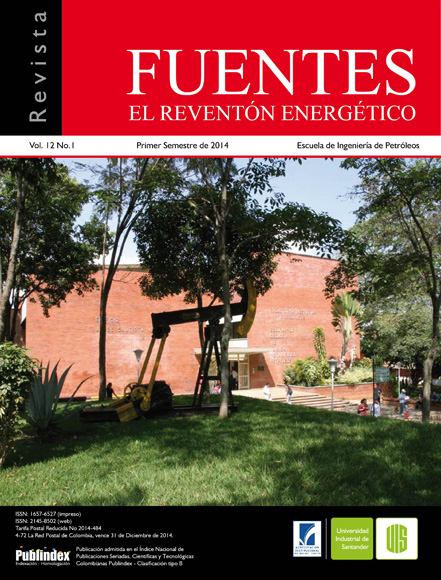Published 2014-08-22
How to Cite
Abstract
RESUMEN
Utilizando la metodología del ácido dinitrosalicílico –DNS-, se evaluó la eficiencia de siete rompedores para degradar el polímero usado en los fluidos de fractura base agua. Cuatro de ellos, entre agentes oxidantes y un ácido inorgánico, son empleados tradicionalmente en las operaciones de fracturamiento hidráulico. Los tres rompedores adicionales fueron propuestos en este estudio y correspondieron a dos ácidos orgánicos y una enzima comercial.
Las evaluaciones se realizaron a tres temperaturas: 60, 80 y 100 °C en un tiempo no mayor que 24 horas de reacción. Se evidenció que algunos rompedores tradicionales que reducen la viscosidad de los fluidos de fractura no son efectivos para degradar el polímero y que pueden incrementar los daños por residuos poliméricos en el sistema poroso de la fractura y la formación. La enzima comercial presentó mejores resultados de degradación que los agentes oxidantes, aunque su actividad catalítica disminuyó a altas temperaturas. Los ácidos presentaron gran eficiencia para degradar el polímero de los fluidos de fractura. Sin embargo, los ácidos orgánicos requieren condiciones especiales de tiempo y temperatura para activarse y degradar el polímero.
Palabras Clave: Dns, Control de Calidad, Polímero, Oxidantes, Ácidos, Enzima.
Efficiency evaluation of breakers in water-based fracturing fluids
ABSTRACT
Using the dinitrosalicylic acid methodology –DNS-, were evaluated seven breakers to degrade the polymer used in the water-based fracturing fluids. Four of them, including different oxidizing agents and an inorganic acid are traditionally used in hydraulic fracturing operations. The three additional breakers were proposed in this study and corresponded to two organic acids and a commercial enzyme.
Evaluations were performed at three temperatures: 60, 80 and 100 ° C in a time not more than 24 hours of reaction. It was evident that some traditional breakers that reduce the viscosity of fracturing fluids are not effective to degrade the polymer and could increase the polymeric damage in the porous system and in the fractured formation. The commercial enzyme showed better degradation results than oxidants, although its catalytic activity decreased at high temperatures. Acids presented great efficiency to degrade the polymer in the fracturing fluids. However, organic acids require special conditions of time and temperature to activate and degrade the polymer.
Keywords:Dns, Quality Control, Polymer, Oxidants, Acids, Enzyme.
